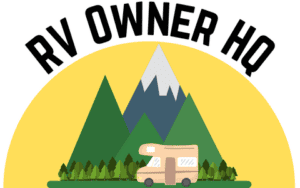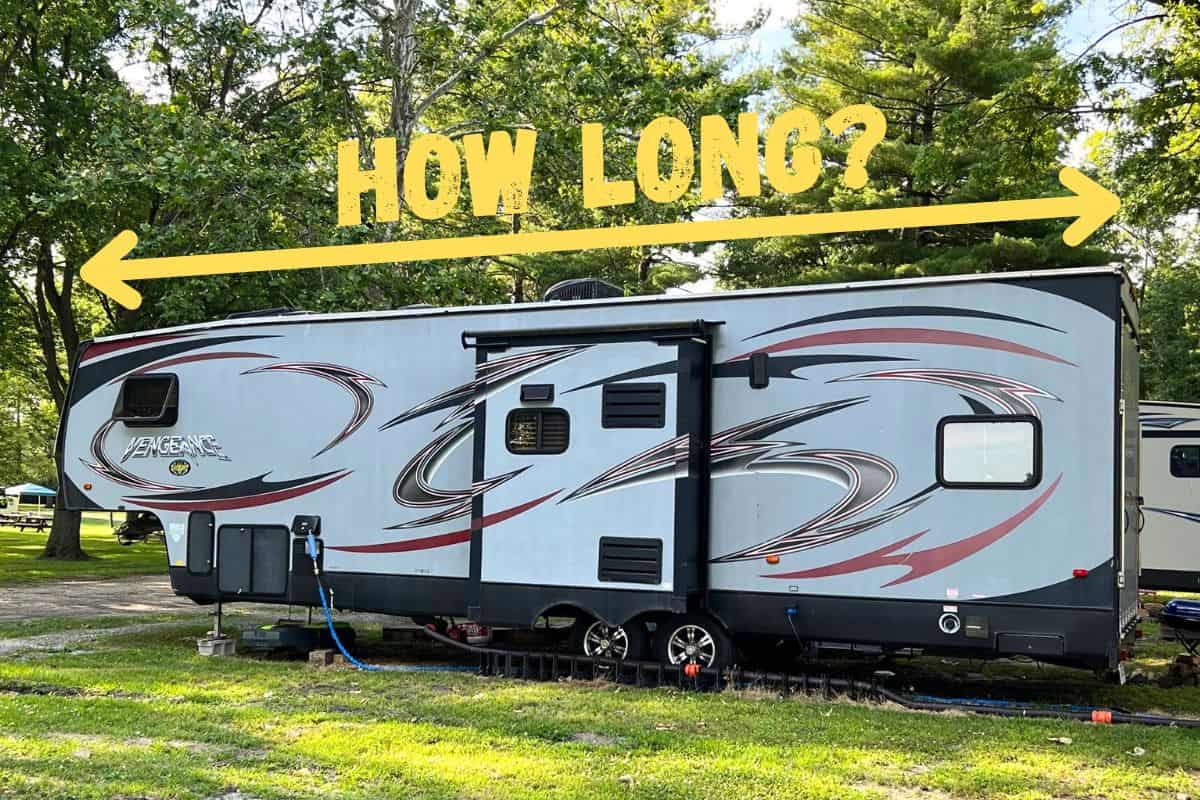How long are 5th-wheel campers?
That’s a question many RVers and potential buyers often ask when considering these popular campers. The truth is, 5th wheel campers come in a wide range of lengths, each offering unique features and benefits to suit different travel styles and needs.
5th wheel campers, known for their distinctive raised forward section extending over the truck’s pickup bed, can range from compact 24-footers to massive 48-foot luxury homes on wheels.
In this fifth wheel length guide, we’ll explore various 5th wheel trailer lengths, answering not just how long they are, but also going into what these different sizes mean when it comes to the camping experience.
So, if you’ve ever wondered about the length of fifth-wheel campers or how long RVs typically are, you’re in the right place.
5th Wheel Camper Lengths: Compact to Colossal
Fifth-wheel trailers come in various sizes to accommodate different camping styles and needs, from basic weekend getaway rigs to luxurious full-time RVs.
Because of this, there are many types and lengths of 5th wheels, ranging from compact to colossal. On average though most 5th wheels fall between 30 and 40 feet long.
To understand 5th wheel lengths a little better though, let’s break down their four main size classes, ranging from compact to extra large.
Compact/Ultra-lightweight 5th Wheels (Under 30 Feet)
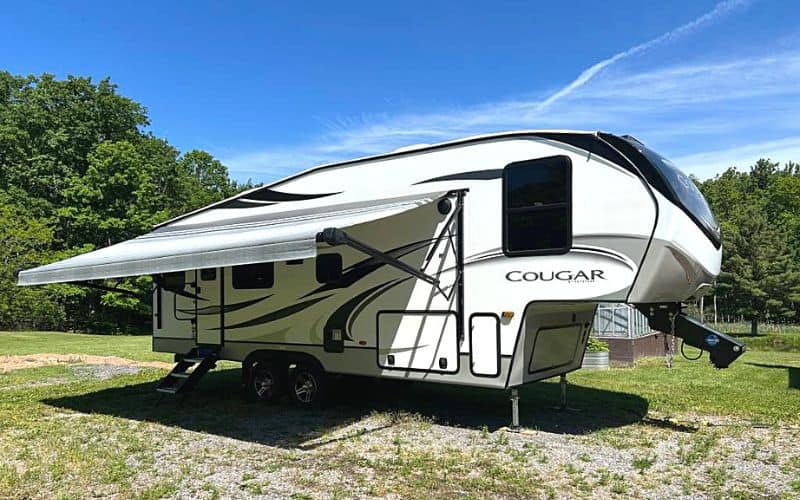
At the smaller end of the scale, we have ultra-lightweight compact 5th wheels.
Typically measuring under 30 feet and as short as 25 feet, these nimble rigs are ideal for couples or small families who prioritize maneuverability and fuel efficiency.
| Make/Model Trim | Length | Dry Weight | Known For |
|---|---|---|---|
| 1. KZ RV Sportsmen 231RK | 24′ 10″ | 6,340 lbs | Ultra Lightweight |
| 2. Palomino Puma 255RKS | 28′ 5″ | 6,754 lbs | Ultra Lightweight |
| 3. Keystone RV Cougar Half-Ton 25RES | 28′ 10″ | 7,681 lbs | Under 30 Feet |
| 4. CrossRoads Cruiser Aire CR24RL | 28′ 11″ | 6,948 lbs | Ultra Lightweight |
| 5. Forest River Rockwood Ultra Lite 2442BS | 28′ 11″ | 7,950 lbs | Under 30 Feet |
To see other popular fifth wheels under 30 feet, check out our blog post “12 Best 5th Wheels Under 30 Feet (With Pricing)“.
Mid-size 5th Wheels (30-35 Feet)
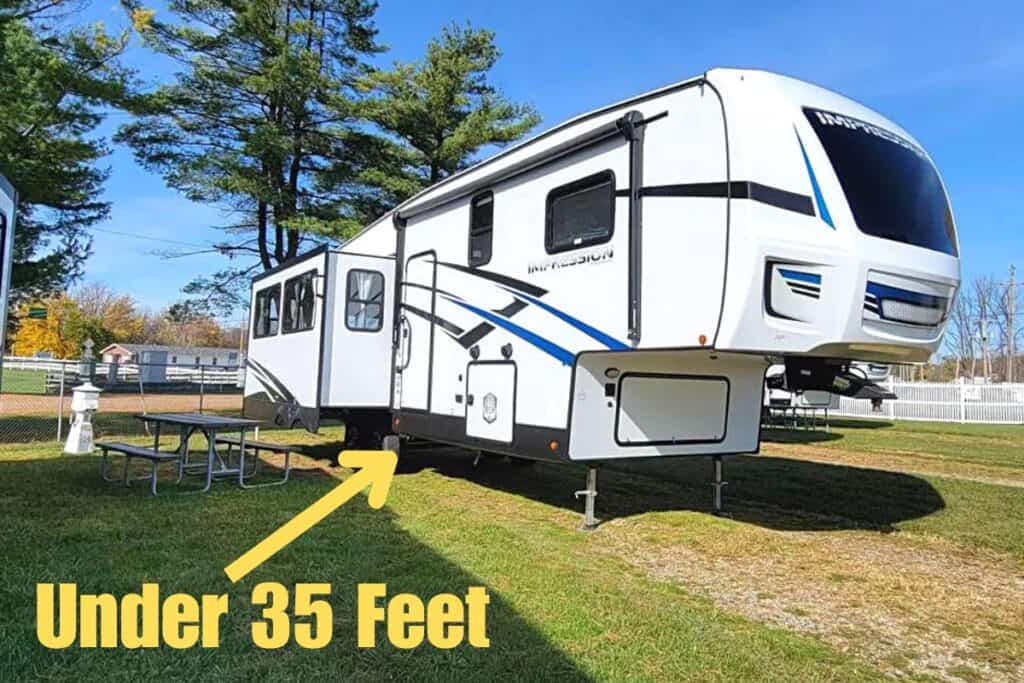
Mid-size 5th wheels, typically 30 to 35 feet long, offer more living space, amenities, and higher sleeping capacities while still being manageable in size.
| Make/Model/Trim | Length | Dry Weight | Known For |
|---|---|---|---|
| 6. Jayco Eagle HT 24RE | 29′ 1″ | 8,060 lbs | Lightweight |
| 7. Forest River XLR Micro Boost 301XLRE | 32′ 6″ | 8,348 lbs | Lightweight |
| 8. Grand Design Reflection 320MKS | 34′ 9″ | 10,721 lbs | Lightweight |
| 9. Keystone Montana 3123RL | 35′ 1″ | 12,482 lbs | Couples RV |
To see other popular fifth wheels under 35 feet, check out our blog post “10 Best 5th Wheels Under 35 Feet (With Pricing)“.
Large 5th Wheels (35-42 Feet)
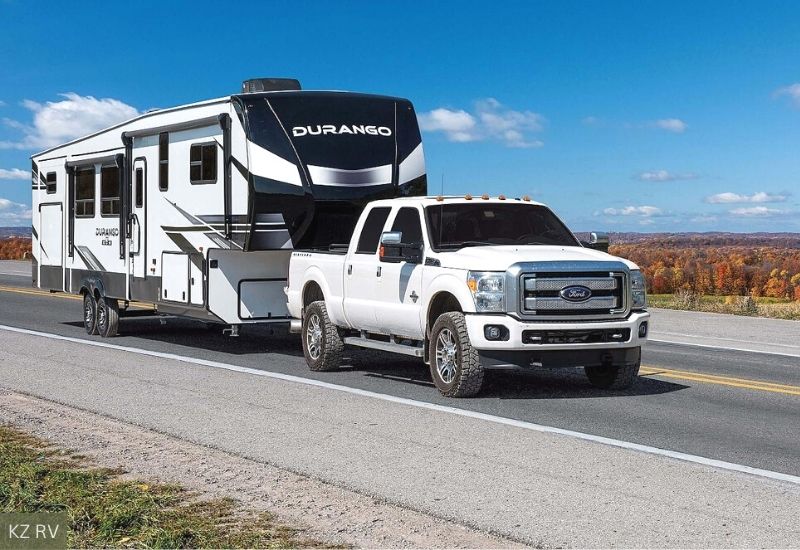
Large 5th wheels, ranging from 35 to 42 feet, provide extra length for more luxurious features and spacious floor plans.
| Make/Model/Trim | Length | Dry Weight | Known For |
|---|---|---|---|
| 10. Northwood Arctic Fox Grande Ronde 32-5M | 36′ 10″ | 13,491 lbs | Cold Weather |
| 11. Forest River Impression 315MB | 38′ | 10,338 lbs | Office Space |
| 12. Palomino Puma Unleashed 382THS | 39′ 10″ | 10,218 lbs | Lightweight |
| 13. Grand Design Solitude 378MBS | 40′ 2″ | 14,344 lbs | Office Space |
| 14. Forest River Cherokee Wolf Pack 315PACK12 | 40′ 7″ | 11,220 lbs | Toy Hauler |
| 15. Alliance Paradigm 380MP | 40′ 11″ | 14,025 lbs | Office Space |
| 16. KZ Durango Gold G386FLF | 41′ 11″ | 13,420 lbs | Cold Weather |
Extra-large 5th Wheels (42+ Feet)
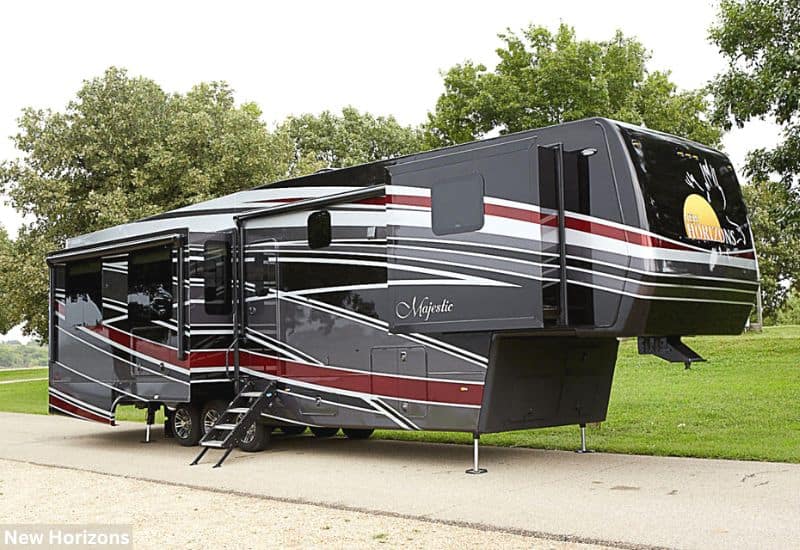
For those who want the ultimate in space and luxury, extra-large 5th wheels are the biggest rigs on the road, typically exceeding 42 feet in length.
These massive rigs are essentially homes on wheels, perfect for full-time RVers or large families.
| Make/Model/Trim | Length | Dry Weight | Known For |
|---|---|---|---|
| 17. Keystone RV Avalanche 390DS | 43′ | 14,300 lbs | 3 Bedroom |
| 18. Jayco Seismic 395 | 44′ 1″ | 14,890 lbs | Toy Hauler |
| 19. Luxe Elite 44FL | 44′ 11″ | 21,700 lbs | Luxury |
| 20. Dutchmen RV Yukon 421FL | 45′ 8″ | 15,150 lbs | Luxury |
| 21. Dutchmen Voltage Triton 4271 | 46′ 4″ | 15,103 lbs | 3 Bedroom |
| 22. Heartland RV Cyclone 4014C | 46′ 7″ | 16,302 lbs | Toy Hauler |
| 23. New Horizons 48 FT Majestic M48IK4S | 48′ | 24,060 lbs | Longest |
To see the longest fifth wheels on the market, take a look at our blog post “The 7 Longest 5th-Wheel Campers You Can Buy!“.
What Determines the Length of a 5th Wheel Camper?
When exploring how long 5th wheel campers are, it’s important to understand the factors that influence their length.
Several key elements determine the overall size of these popular RVs:
- Floor plan design: The internal layout is a key factor in determining how long 5th wheel trailers are. Manufacturers design floor plans to maximize livability based on length. For example, a 5th wheel with a spacious master bedroom, full kitchen, and separate living area will naturally be longer than one with a more compact, open-concept design.
- Living space requirements: The intended use of the 5th wheel plays a big role in its length. For example, weekend campers might prefer shorter 5th wheels for easier towing and storage, while full-time RVers often opt for longer models to ensure ample comfort and living space.
- Sleeping capacity: The number of people a 5th wheel can sleep significantly impacts its length. For instance, couple-oriented models are often shorter, focusing on a single main sleeping area, while family-friendly 5th wheels need extra length to include bunk rooms, bunk beds, or even three bedrooms.
- Tow vehicle compatibility: The length of a 5th-wheel camper is also influenced by the towing capacity of popular trucks. RV manufacturers often design their campers with certain tow vehicles in mind, for example, shorter, lighter 5th wheels are often designed for half-ton and three-quarter-ton trucks, while longer, heavier models are built for heavy-duty trucks with higher towing capacities like 1-ton trucks.
- Storage and cargo Space: The need for storage and cargo space can significantly impact the length of a 5th wheel, as models with extra storage may require additional length to accommodate the extra capacity. This is especially evident in toy hauler models, which are often longer to accommodate a garage area.
Understanding the Relationship Between 5th Wheel Length & Weight
When exploring how long 5th wheel campers are, it’s important to consider the relationship between length and weight.
As these two factors are closely intertwined and play a significant role in determining the overall design and functionality of a 5th-wheel RV.
How Length Affects the Overall Weight
Generally, longer 5th-wheel campers tend to be heavier, but this correlation isn’t always linear. Here’s why:
- More space often means more stuff: Longer RVs typically have more storage space, which often leads to more items being packed, increasing the overall weight.
- Structural requirements: Longer trailers require stronger frames and support structures to maintain integrity, adding to the base weight.
- Additional axles: Very long 5th wheels may require a third axle for proper weight distribution, which adds to the overall weight.
For example, when comparing how long 5th wheel RVs are, you might find that the 35 foot 1 inch Keystone Montana 3123RL weighs 12,482 pounds, while the much longer 40 foot 7 inch Forest River Cherokee Wolf Pack 315PACK12 weighs 11,220 pounds. These two models clearly show how construction and intended use can affect the weight of a 5th wheel and not just its length.
Other Factors Influencing 5th Wheel Weight
While length is one of the main factors that affect 5th wheel weight, it’s not the only one, as several other elements contribute to the overall weight of a fifth wheel:
- Construction materials: Lightweight materials like aluminum or fiberglass can significantly reduce weight without compromising strength.
- Amenities and features: Luxury items like residential refrigerators, washers/dryers, or entertainment systems add weight regardless of the RV’s length.
- Slide-outs: While slides expand living space, they also add considerable weight to the unit, adding as much as 1,000 pounds per slide-out.
- Tank capacities: Larger fresh, gray, and black water tanks increase weight but don’t necessarily require more length.
- Furniture: The type and amount of furniture included in an RV can greatly impact weight without changing the length.
Importance of Weight & Length When Towing
Understanding the relationship between length and weight is crucial when answering “How long of a 5th wheel can I safely tow?”
Below are some of the main points to consider:
- Tow vehicle capacity: Your truck’s max towing capacity will limit the length and weight of the 5th wheel you can safely haul.
- Pin weight: Longer 5th wheels often have higher pin weights, which affects the truck’s payload capacity and what type of truck you need.
- Maneuverability: Length affects turning radius and overall maneuverability, while weight impacts braking distance and stability.
- Fuel efficiency: Both length and weight affect fuel consumption, with heavier and longer trailers requiring more fuel to tow.
- Campground restrictions: Some campgrounds have length restrictions, while others may have weight limits on certain roads or bridges.
Factors to Consider When Selecting 5th Wheel Length
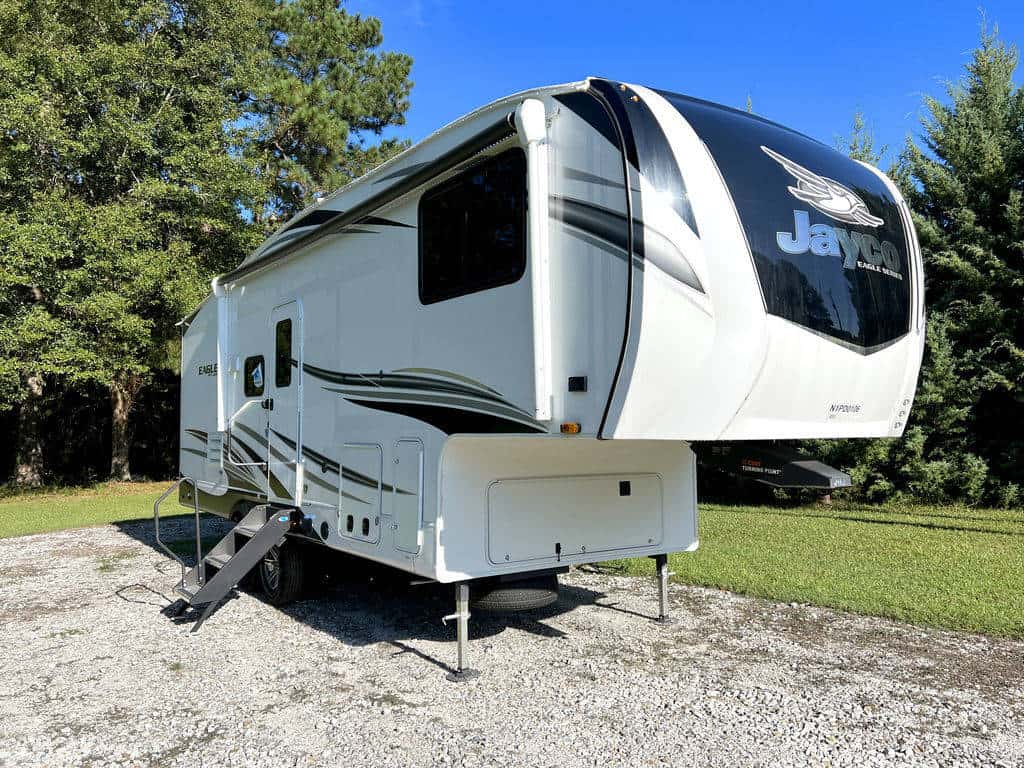
When deciding on 5th-wheel camper length there are several factors to consider, which we’ve outlined below.
- Towing vehicle capacity: The length of your 5th wheel is directly related to its weight, which must be within your truck’s max towing capacity and ideally below the 80 Rule for towing.
- Intended use and travel style: Your camping habits and preferences can play a large role in determining how long your 5th wheel should be. Weekend warriors often prefer shorter, more maneuverable models, while full-time RVers often opt for longer 5th wheels with more living space and amenities.
- Storage limitations: When not on the road, you’ll need to store your 5th wheel somewhere. With that being said shorter fifth-wheels are generally going to be easier to store and possibly cheaper at RV storage facilities.
- Campground accessibility: Not all campgrounds can accommodate extra-long 5th wheels. National and state parks often have strict length limits. In general, longer 5th wheels will limit your campground options.
- Interior layout and features: The length of your 5th wheel will impact the available floor plans and amenities. Longer models often offer more separation between living areas, while shorter 5th wheels might require more compromise in layout and features.
- Maneuverability and driving comfort: Longer 5th wheels require more driving skill, especially in tight spaces. Consider your experience with towing. It’s also a good idea to think about the types of roads you’ll generally be traveling on (highways, mountain roads, urban areas).
- Budget: Length often correlates with price, but it’s not the only factor. Longer 5th wheels are generally more expensive to purchase, maintain, and store.
- Future needs: If you’re planning to transition to full-time RVing eventually, a longer 5th wheel might be worth considering. In addition, for growing families, a slightly longer model could accommodate future little ones.
Common Campground & Campsite Lengths
The length of a 5th wheel camper can significantly impact where you can stay.
So let’s explore some common length restrictions you might encounter:
National & State Parks Length Restrictions
National and state parks often have stricter length limits due to their natural settings and older infrastructure.
- Many national parks limit RV length to 27-30 feet, which can be challenging for many 5th wheels.
- Some popular parks like Yellowstone have a few campgrounds that can accommodate rigs up to 40 feet, but spots are limited.
- State parks vary widely, with some accommodating larger rigs and others capping length at 30 to 35 feet.
Private Campground Length Restrictions
Private RV parks and resorts generally offer more flexibility for longer 5th wheels.
- Many private campgrounds like KOA can accommodate rigs 40 feet or longer.
- Some luxury RV resorts cater specifically to big rigs, with no maximum length restrictions.
- Even private campgrounds will have some sites with length limitations, especially in popular tourist or more urban areas.
Boondocking & Dispersed Camping Area Length Restrictions
When it comes to boondocking and RV length restrictions there is generally not a lot of limitation.
- Forest Service and BLM lands often don’t have official length restrictions, but access roads and camping spots may limit larger rigs.
- Longer 5th wheels can be challenging to maneuver in undeveloped areas.
- Some popular boondocking spots may have unofficial length limits based on the available space.
FAQs: How Long Are 5th Wheel Campers?
Additional 5th Wheel Resources:
- What is the Lightest 5th Wheel? Solved
- 7 Reasons Why 5th Wheels are Easier to Tow than Travel Trailers
- How Much Wind Can a 5th Wheel Withstand? Surviving Storms
Recent Posts
When cruising down the highway in your RV, the last thing you want is a tire blowout! Not only is it dangerous, but RV tire replacement isn't cheap, costing $200 to $300 per tire. The good news,...
Nothing ruins an RV adventure faster than a breakdown with no way to fix it. Because of this, every RVer should have a well-stocked RV tool kit for those unexpected roadside emergencies and campsite...
